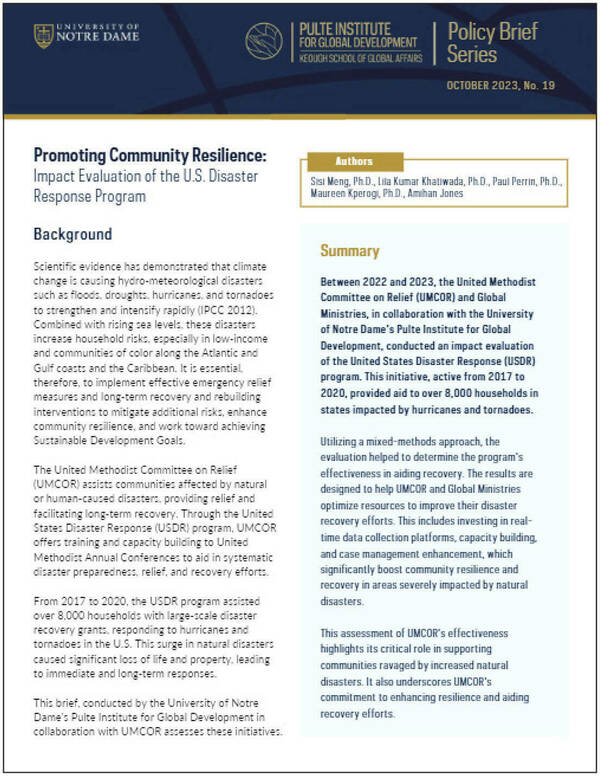
Access the Pulte Institute Policy Brief, which summarizes a research study led by Core Affiliated Faculty member Sisi Meng. The report outlines improvements for a disaster response program by Global Ministries and the United Methodist Committee on Relief (UMCOR) aimed at aiding U.S. coastal areas affected by hurricanes and other natural disasters.
The intensifying effects of climate change have exacerbated the severity and frequency of hurricanes in the Atlantic Basin. Coupled with the prevalence of poverty, it has significantly increased the vulnerabilities of low-income communities across the region.
The United States Disaster Response (USDR) program — an initiative of Global Ministries and the United Methodist Committee on Relief (UMCOR) — has led efforts to provide essential assistance and relief to regions along the Atlantic and Gulf coasts and the Caribbean. Working alongside other faith-based organizations, government agencies, and non-profits, the USDR program has delivered immediate relief and emergency aid while playing a crucial role in long-term recovery and rebuilding efforts.
“For nearly two decades, Global Ministries and UMCOR’s disaster preparation initiatives have made a real difference, providing critically needed support for hundreds of thousands of people,” says Pulte Institute Evidence and Learning Director Paul Perrin. “But crucial gaps remained, and they turned to us to further refine their strategy.”
In 2022 and 2023, the Pulte Institute conducted an impact evaluation of the USDR program from 2017 to 2020. (USDR aided over 8,000 households affected by hurricanes and tornadoes during this span.) The assessment examined the program's effectiveness in supporting recovery efforts to identify ways to enhance resource allocation and improve disaster recovery approaches.
Measuring disaster resilience is complex due to its multidimensional nature (with social, economic, environmental, and institutional dimensions) and context-specific factors (resilience varies greatly depending on the local context, type of hazards, socio-economic conditions, and cultural factors). This variability also means that relevant indicators and measures in one context may not apply in another.
Pulte Institute's evaluation employed a mixed-methods approach to strengthen the depth of their research and its applicability, incorporating comparative household surveys, focus group discussions, and key informant interviews. Perrin says this strategy facilitates greater engagement by providing multiple ways to gather and present data and is particularly useful when “stakeholder perspectives are critical for understanding and addressing real-world problems.”
"For nearly two decades, Global Ministries and UMCOR’s disaster preparation initiatives have made a real difference, providing critically needed support for hundreds of thousands of people. But crucial gaps remained, and they turned to [the Pulte Institute] to further refine their strategy."
The comprehensive data highlights the need to develop pre-disaster management teams with clear roles and responsibilities, address service gaps in rural areas, and enhance the quality and capacity of services like child welfare, healthcare, employment, and legal support to meet varied post-disaster needs. By incorporating these findings, Global Ministries and UMCOR have been able to prioritize efforts that offer the most significant long-term impact.
The USDR program now incorporates more technology, using platforms to gather real-time information from affected individuals and optimizing the distribution of food, water, medical supplies, and personnel. They have also begun to analyze social and demographic information to identify vulnerable populations, such as older adults and people with disabilities, who may need additional support during and after a storm.
The evaluation showed that the USDR program positively impacted household and community recovery (the study results indicate that USDR clients from 2017 to 2020 exhibited a higher resilience level than non-clients). However, the initiative is now elevating its effectiveness after integrating the Pulte Institute's recommendations.
“Our research reframed strategies to help Global Ministries and UMCOR focus on things that have the most meaningful impact — instead of just hoping efforts are successful,” says Core Affiliated Faculty member Sisi Meng, the research study's lead author. “The findings are valuable for improving response strategies, informing long-term planning, and creating resilience-building measures.”